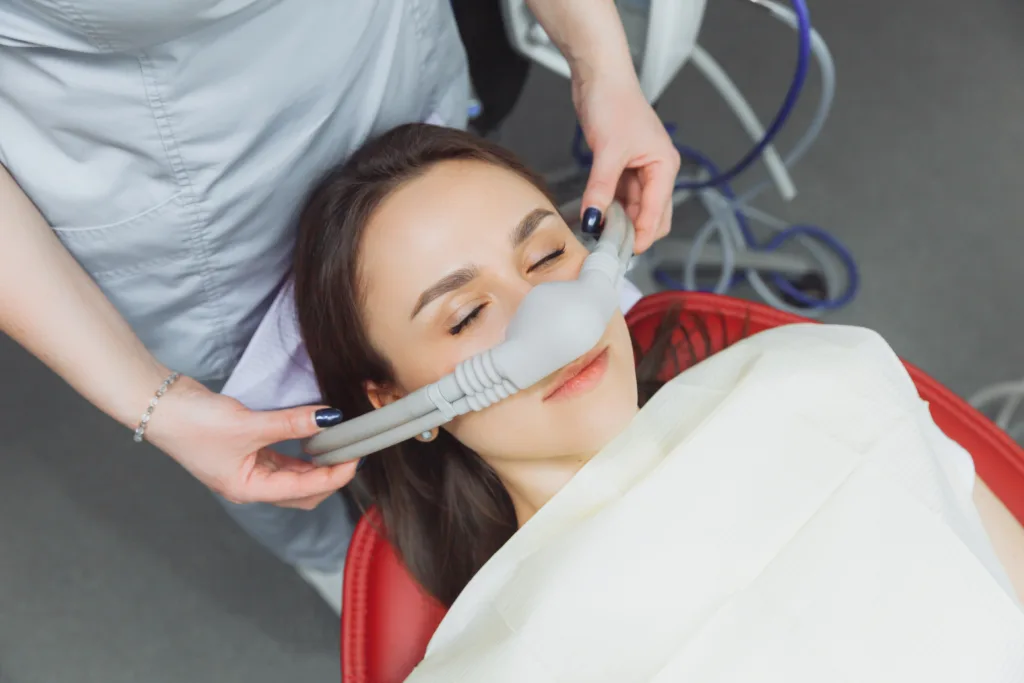
If you are someone you know has special needs, the thought of visiting the dentist could be overwhelming or even terrifying. However, with advancements in dental technology, safe and effective sedation dentistry can truly be a game-changer for those who have special needs or disabilities. This overview will provide an overview of what sedation dentistry is and how those with special needs can benefit from this type of service.
What Is Sedation Dentistry?
If you’re seeking dental care for patients with disabilities, sedation dentistry could be an option to alleviate stress and anxiety. Depending on your situation, we provide different options to meet your needs. They are explained in more detail below.
- Oral Anti-Anxiety Medication: A prescribed pill that eases anxiety while keeping you fully awake and breathing naturally.
- Mild / Moderate Anesthesia (IV): Delivered through an IV, this method relaxes you deeply but keeps you semi-conscious. Patients who need longer or more complex procedures would benefit from this choice.
- Deep / General Anesthesia: An IV-administered option where you’re fully unconscious. This is needed for a more invasive procedure.
Each sedation level is tailored by Dr. Weisner and a skilled anesthesia team to suit your needs and ensure your visit is as stress-free and safe as possible.
Patients Who Benefit From Sedation Dentistry
Dental care for patients with disabilities can be a challenge, whether they suffer from extreme anxiety or get easily agitated. Sedation dentistry helps by easing sensory overload, enabling stillness for those with movement disorders, and reducing anxiety for patients who struggle with medical trauma, making treatment gentle and accessible. Some examples of the individuals who could benefit from this treatment include those with Autism Spectrum Disorder, Down Syndrome, Cerebral Palsy, and Intellectual Disabilities. Generally, people with these conditions can have a harder time communicating their needs, but sedation dentistry can help reduce anxieties or fears about visiting a dental provider.
Smoother Treatments When Movement Is A Challenge
Movement disorders can be a real challenge for anyone visiting the dentist. For example, involuntary movements are commonly associated with Cerebral Palsy. Sedation dentistry can calm the muscles and reduce stress associated with an upcoming procedure. As a result, our dental team can perform necessary procedures more smoothly and safely. It allows us to work for the best needs of every patient we serve, regardless of their situation. We’re always available to discuss what dental services are best for every patient.
Why Dental Care For Patients With Disabilities Matters
Good oral hygiene or preventative care is only brushing the surface of the importance of dental care for disabled patients. If someone has a physical or cognitive disability, they likely have trouble brushing correctly or have side effects (like dry mouth) from their current medications. They may also have sensory sensitivities that can increase the risk of tooth decay or gum disease, which ultimately leads to infections. Over time, these issues can quickly spiral out of control into advanced systemic diseases or unbearable pain.
If your loved one has a disability, one of the best things you can do for them is ensure they’re getting routine dental care. This ensures a proactive approach that allows us to identify potential issues before they worsen. Dr. Michael Weisner and the team at Total Arch Dental Implant Center can adapt environments for special needs patients and communicate effectively throughout the process. It’s our mission to ensure every patient gets the dignified care they deserve.
Common Questions About Sedation Dentistry for Patients with Special Needs
Sedation dentistry could be an invaluable tool for special needs patients. The goal is to provide safe and effective dental care while minimizing stress or anxiety. Below are some commonly asked questions about it.
- Is sedation dentistry safe for individuals with disabilities? Yes, sedation dentistry is generally considered safe. We carefully evaluate each patient’s medical history and determine which type of sedation method will be most effective.
- Will my loved one be awake during the procedure? It depends on the sedation method chosen. Oral anxiety medications keep you fully awake, but other methods described above keep you semi-conscious or fully unconscious.
- Can all necessary dental work be completed in one visit? It is possible for all dental work to be completed in one visit, which is beneficial for disabled patients who suffer from anxieties or stress.
Experience Compassionate Dental Care for Patients with Disabilities
At Total Arch Dental Implant Center, we understand the unique challenges faced by individuals with disabilities when it comes to dental care. We invite you to reach out and schedule a consultation to discuss how we can meet your specific needs. Our compassionate team is ready to provide the exceptional care you deserve. Contact us to schedule an appointment or if you have any questions.
